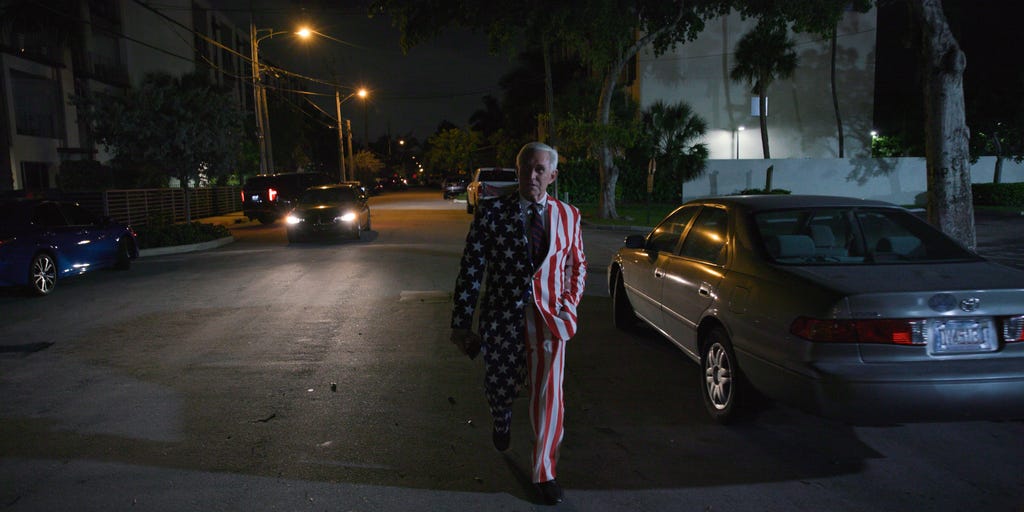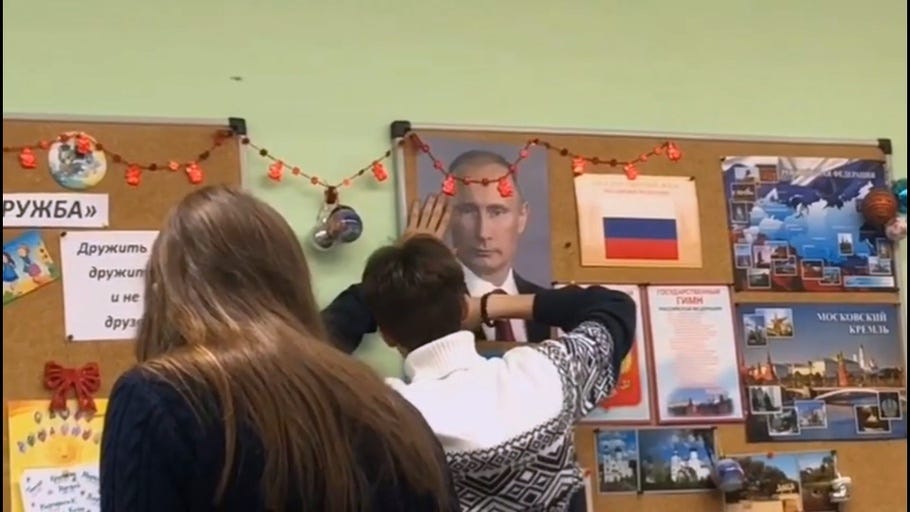Virtual Dispatches from the 2023 Camden International Film Festival
The acclaimed documentary festival comes to you.
The 2023 Camden International Film Festival's in-person screenings were threatened over the course of this past weekend, as Hurricane Lee made his presence known up and down the east coast. Festival staff were put to the test, facing power outages and strong weather. The show(s) did go on, however, with a little patience and a lot of hard work.
The virtual festival, meanwhile, which runs through September 25th, has gone off without a hitch. I've had the pleasure of virtually attending from my home base of Baltimore, Maryland and, thanks to the strong and diverse programming and the help of CIFF staff, you'd have no idea the trouble it's been. Below are a few offerings from the festival - for more information and virtual tickets of your own, visit their website.
A Storm Foretold
This is a jaw-dropping case of right-time, right-place filmmaking. (Director Christoffer) Guldbrandsen began his project in 2018, before (Roger) Stone was convicted, pardoned by the president, and quietly reinstated in time to orchestrate his ‘Stop the Steal’ masterplan that led to the attempted coup. Guldbrandsen is there for the entire rollercoaster ride, up until the immediate, acrimonious, aftermath of January 6.
In his 2017 book The Making of the President 2016: How Donald Trump Orchestrated a Revolution, Roger Stone (who definitely wrote the book) drops names like Richard Nixon, Roy Cohn, Ronald Reagan, Donald Trump, and George Steinbrenner as if there's no reason not to drop those names. He regales stories from the high floors of Trump Tower and from the skies in private jets and from the country's most historic places. It's from these places that Roger Stone has been on the periphery of Republican politics. He's a right place, right time kinda guy. When he writes about how Trump won the 2016 race, he leaves out his own corruption scandal, the one that led a federal jury to convict him of obstruction, witness tampering, and making false statements to Congress.
Documentary filmmaker Christoffer Guldbrandsen was also in the right place at the right time, following Stone from 2018 to the inevitable collapse of the Trump Presidency on January 6th, 2021. Was his project prophetic in predicting the demise? Did he know how the story would change as Coronavirus spread, Roger dropped out of filming, or when Biden defeated Trump? Maybe Roger Stone is just too interesting a person to not want to make a documentary about (Get Me Roger Stone was released in 2017 and this film depicts another documentary crew with a desire to follow Roger around), because as Trump eats his Kentucky Fried Chicken in the Presidential Bedroom Suite, Stone goes to bat for him on video calls to Alex Jones' InfoWars and in what looks to be frat-parties.
That's because Roger likes attention, which he gets plenty of when a film crew follows him around. (He likes attention so much, he'll show you his ability to do a convincing spit-take, even if he doesn't have a drink around.) As a result, they capture him at his most silly, his most fearful, his most conniving, his most drunk, and his most lonely.
Manifesto
A montage of digital vignettes, captured and shared by today’s Russian youth via YouTube and TikTok. Ranging from the sunlit innocence of spirited school gatherings, to the chilling activities of mass evacuations, and the constant permutations of control and dogma. In this symphony of narratives, a complicated tale intertwines, painting a captivating portrait of how a state’s ideology may create some of our darkest dreams in our most innocent minds.
As Americans, we know that Russia is a bad place to live. We understand that Putin is a bad man. We support the people on the frontlines in Ukraine, we send our trademark Thoughts and Prayers™, and we imagine life halfway across the globe...and how bad it must be.
But that's about it for the average American.
Manifesto doesn't let you imagine life in Putin's Russia, it shows you. It shows you through the lens of the average schoolchild, collecting 68 minutes worth of YouTube vlogs and TikTok uploads from their perspective. It is, in a word, unnerving. Teachers threatening students. Teachers beating students. Teachers groping students. Nuclear war drills. School shooters are regular occurrences - students leap from third-story windows to get away if they aren't filming the whole thing on their phones.
Filmmaker Angie Vinchito (a pseudonym for the faceless figure who introduces the film) isn't just showing you the clips that you could find online yourself. This collage is sourced from videos that have hundreds of thousands of views online, yes, but also includes videos and shorts with as little as one view. (Given the tyrannical nature of the Russian government, many have raised the ethical dilemma of not blurring children's faces or censoring their real names, but it must be noted that these videos do live publicly online somewhere already). It's a film that doesn't make a call to action or invite thoughts or feelings, it's a film that shows daily life as it exists, or at least how it appears on the internet - it just makes you think and feel about what that life must be like for roughly an hour by showing you an unlikely and unknowingly connected community of online documentarians.
Grasshopper Republic
Filmed over the course of three seasons, GRASSHOPPER REPUBLIC follows a local grasshopper trapping team in verité style, as these modern-day prospectors push into remote forests seeking their fortune by capturing this elusive prey.
In Uganda, grasshoppers are a delicacy. They are respected. They are treasured. As a result, there is an entire economy based around the collecting and harvesting of the creature, as they are a primary source of income for many. "What other business can we do without an education?" remarks one trapper early in the film.
Grasshopper Republic requires your patience, the same patience required of these farmers. You are waiting for the rain as they wait for the rain - when it rains heavily, the grasshoppers swarm. So you wait. You watch them set up camp. You watch them prepare. You watch them wait.
Daniel McCabe's film gives you the lens through which you watch the beauty of the nature they inhabit - "they" being both the Ugandans and the grasshoppers. As you watch the harvesters up close, you also see the grasshoppers up close as they, too, wait for the rain. When the rain does come, it's magical. It's a dance, a ballet - one set to the atmospheric music of Robert Aiki Aubrey Lowe. It's worth the wait. For the harvesters, of course, who get what they need, but for us as well.
The Lady Bird Diaries
Shortly after she became First Lady (a term she always abhorred) Lady Bird Johnson started recording audio diaries--files that remained private until her death at 94. Drawn entirely from archives, the film is a remarkable insight into both a family thrust unexpectedly into the White House, and a nation navigating perhaps the most significant era in its history.
The role of the First Lady is a complicated one in this country. Unelected, but a political figure just the same, the spouse of the President sees more, hears more, understands more, and, as a result of being married to the country's highest leader, feels more than we will ever know.
Lady Bird Johnson didn't expect to be First Lady, but the film The Lady Bird Diaries (which is bound to be difficult to find in a Google search thanks to a certain other film) begins when she takes the job from Jackie Kennedy. John has been shot dead in Texas and before she, or anyone else for that matter, realizes it, Lyndon B. Johnson is taking the Oath of Office. It's around this time that she begins recording diary entries on tape of not only what it was like that particular day, but over the course of the next few years in a job (she hated the term "First Lady") that she once described as an "unpaid public servant elected by one person - her husband."
More than most, she's a crucial part of her husband's Administration, standing by his side on Air Force One before it leaves Dallas, as he signs the Civil Rights Act of 1964, as he runs for reelection. Filmmaker Dawn Porter has crafted a film, using Lady Bird's forethinking narration, that creates a living and breathing artifact of what it's like in the chair right next to one of the most important chairs in the world.
Media courtesy of Camden International Film Festival.







